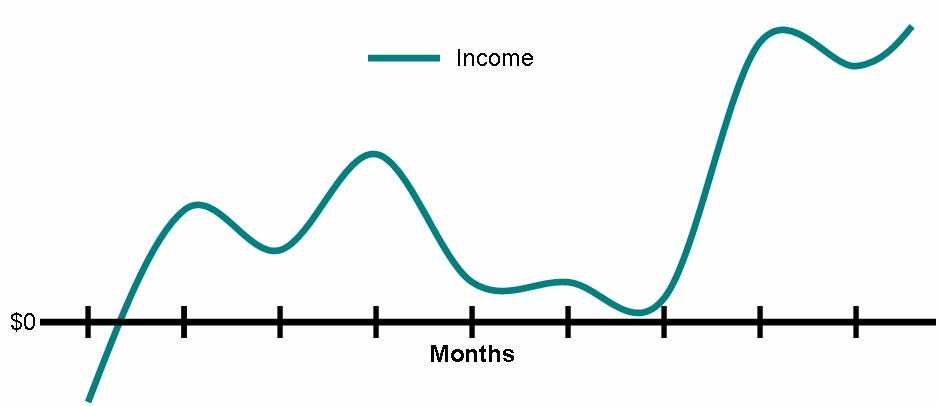Many people are not on a standard salary or monthly income. There are people who survive on irregular sources of income. You may be a sales person whose income is fully or partially paid via commission. You may be self employed and not yet able to pay yourself a standard monthly income. You may even be employed but every so often you get a bonus or some sort of lump sum payout. Managing irregular income is different but can be done. We sometimes hold ourselves hostage by believing that we cannot manage our money or build a financial plan because of this. Sometimes we honestly just use this as a delaying tactic or an excuse to procrastinate about getting our finances in order. Here are a few tips that may help you if you are in this sort of cycle.
- Know what your fundamental expenses are. Despite the fact that you do not earn on a monthly basis you probably have monthly expenses. This is where the biggest disconnect or challenge with this situation comes in. Money may not be coming in on a particular month but you have rent, food, transport, utilities etc. that have to be paid monthly. Calculate what this amount is to you. You need to have a specific figure of the amount of money you need to sustain yourself per month.
- Do not get excited when you are paid. The amount of money that you have in the bank does not signify the amount of money that you should spend. You many have received your commissions or a client has paid you. The presence of temporary liquidity does not indicate that is the entire amount money you should spend in a short period of time. This is not yet the time to go “treat” yourself. If you have done step no 1, you will be now be conscious of how far this money can take you. This simple calculation will sober you up. It may be able to sustain your basic expenses for a couple of months. Since you don’t earn income every month, spend it only on those basic expenses first. This is not the money you use to upgrade your phone or buy a plot of land. There is really no point owning these things only to find that you cannot afford to eat.
- Pay your basic expenses in advance. If you have received a lump sum, pay rent in advance for two or three months. Pay school fees, utility bills and any other expense that can be paid monthly. Even if you do not earn money next month it is of some comfort to know that you still have a roof over your head and children are in school. There are some expenses that you may not be able to pay in advance but you can be clever with them. I have found that bulk buying of dry foods and some household items cuts down on the overall cost, removes the pressure of a huge monthly cash outlay and saves you time.
- Move money away from your regular account. Apart from the point above, you can also control your spending by ensuring money is not in your current account. You can place it in a separate savings account and remove the money that you need on a monthly basis. Think about it like paying yourself a monthly maintenance allowance. To help you with this, you can also start tracking your income cycle. Maybe you will find that on average you get a payment every 2-3 months. That shows you that this account should typically have money that can sustain you for at least three months. I would even suggest you push it up a month or two. You may be one of those people whose irregular income cycle is shorter than the expense cycle. For example you earn money every week but major expenses occur monthly. This money can still be kept in this separate account for those major expenses at the end of the month. Based on your income cycle, you know what kind of buffer to create. Once that buffer is in place you can then think of doing other things as you earn money. You can increase the buffer, you can spend on other things that may not be covered in your basic expenses or you can invest.
- Do not borrow. You should not be borrowing to sustain these expenses as you are just digging yourself into a deeper hole. Borrowing for lifestyle is never advisable. Every time you borrow you create a new ongoing expense. Cut down on expenses if you have to. Repayment of any debts you have accumulated in the past should just form part of the monthly bills that you plan for but do not take on more debt.
The biggest shift that has to happen in managing irregular income, is not spending all the money that you may have access to. Managing irregular income is different but not impossible. It does require a bit more discipline and control over your spending. However in time this discipline is exactly what is needed even to progress in other areas in your financial life.


Thanks @waceke.
The article sheds light on an hitherto mismanaged irregular income. The same applies to the extra income we get from part-time jobs which go to consumption instead of investment.
Thanks for keeping us financially enlightened.
Very well said. True to centonomy spirit and teachings. Everyone who cares (..and I am sure we all do) should read and practice this.
thanks
Thanks for enlightning me regarding financial management be blessed
its an inspiring article which provides an open minded idea on what to archieve in whatever ambitions one’s has,kudoz
It’s impressive that you are getting ideas from this article
as well as from our argument made at this time.